AMD Ryzen 7 1700X Review
Why you can trust Tom's Hardware
3DMark, Ashes of the Singularity, Battlefield 1 & 4
3DMark
We don't consider synthetic benchmarks to be a good measure of real-world gaming performance, but 3DMark's DX11 physics and DX12 CPU tests provide useful metrics that quantify the amount of processing power available to the game engine.
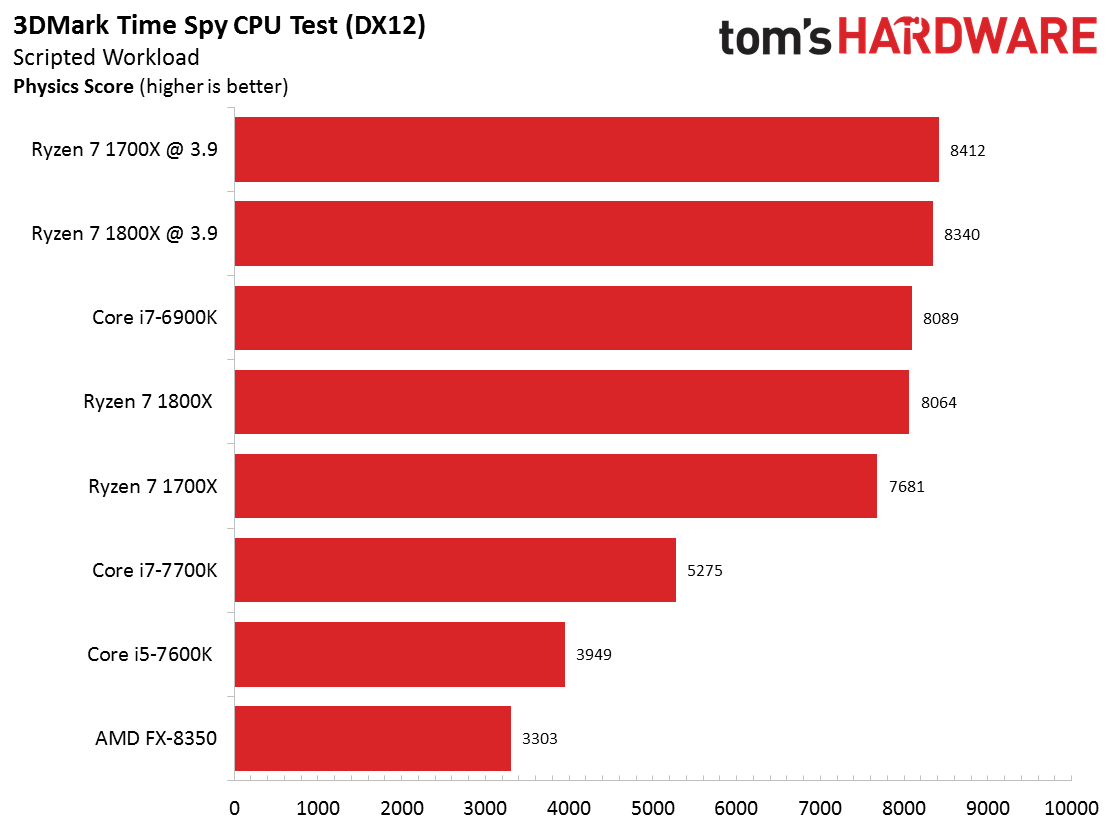
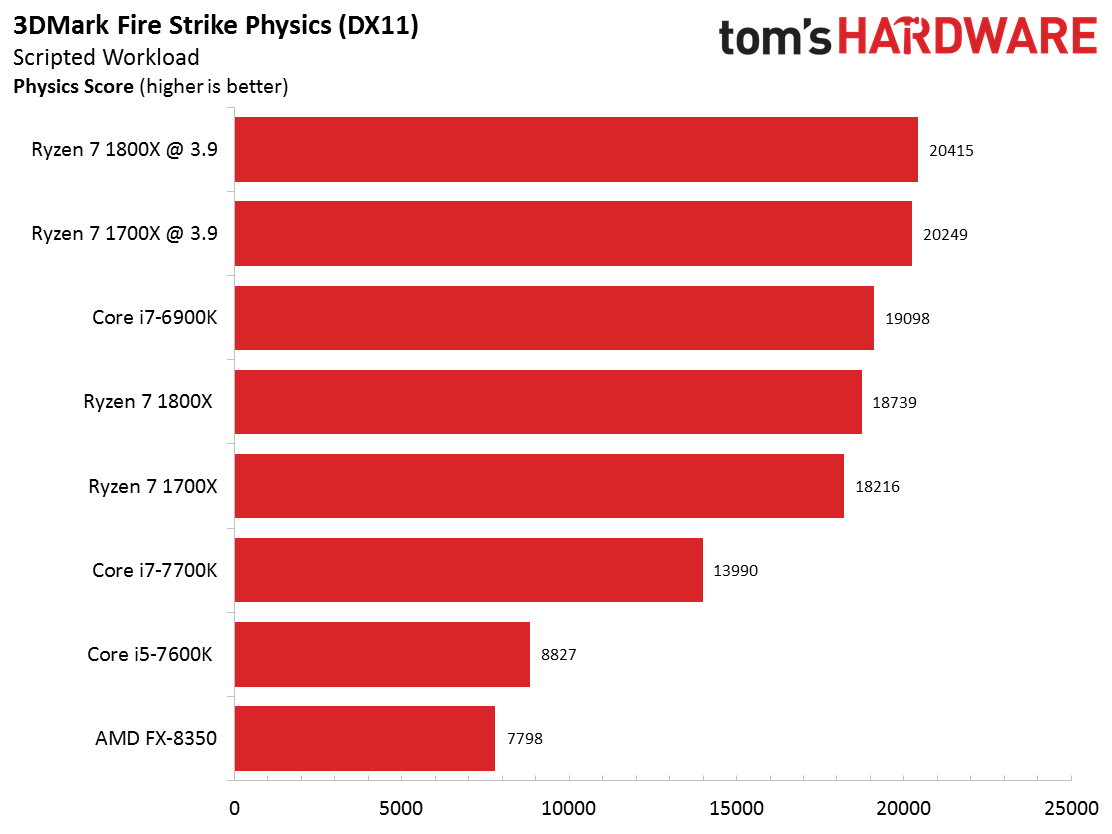
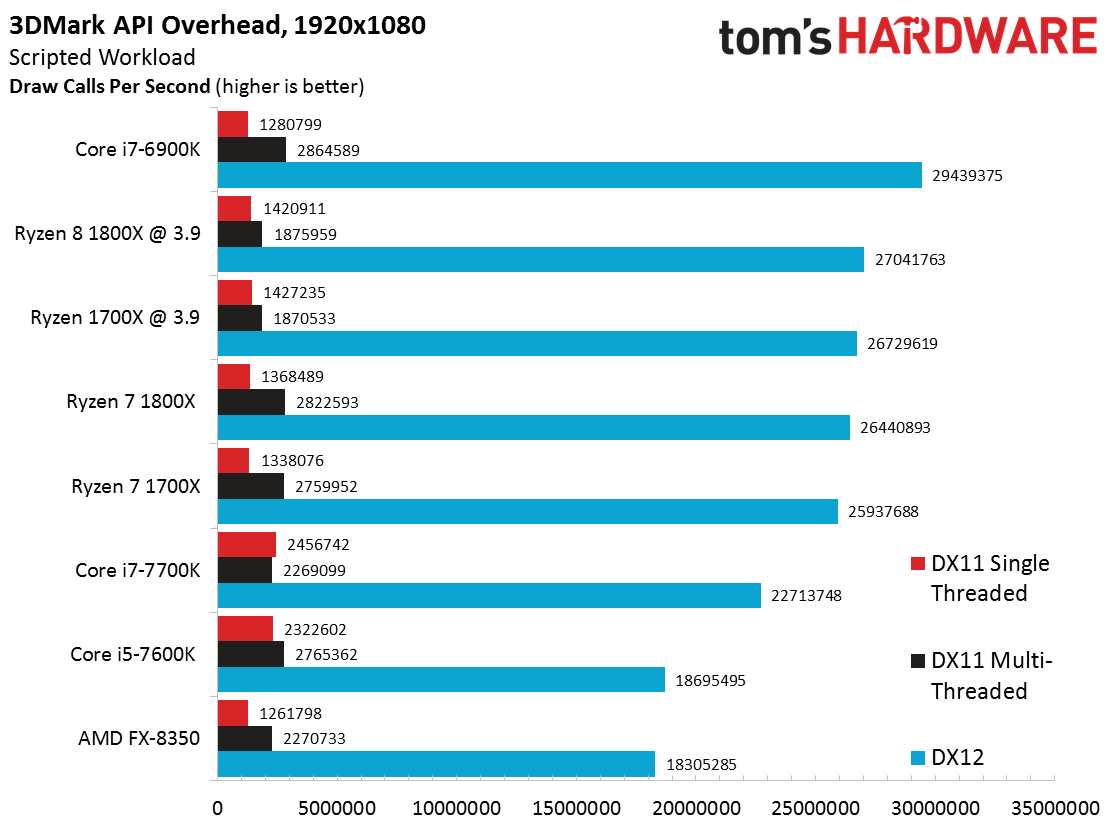
The stock Ryzen 7 1800X comes close to unseating Intel's Core i7-6900K during the DX12 CPU test. AMD's 1700X trails its faster counterpart by 383 points. However, overclocking both chips to 3.9 GHz shrinks the gap to 72 points...in favor of the 1700X.
Futuremark's DX11 Fire Strike benchmark runs 32 parallel soft and rigid body physics simulations that tax the processor specifically. We notice a similar trend during the DX11 physics test; both Ryzen processors lag the i7-6900K at stock settings, but overtake Intel when overclocked. Rest assured that we're planning a follow-up that has each of these unlocked CPUs tuned up to show how they ultimately fall in relation to each other.
The Ryzen processors offer better single-threaded DX11 performance when we overclock them, yet curiously turn in worse results in the threaded DX11 test compared to the stock settings. We repeated this test multiple times just to be sure. In spite of the odd outcome, both AMD CPUs beat the Core i7-6900K in 3DMark's DX11 single-threaded test, regardless of clock rate.
Ryzen 7 demonstrates a tremendous DX11 single-thread deficit compared to the Core i7-7700K and i5-7600K, which helps explain Intel's commanding lead in titles that are primarily sensitive to single-threaded performance. The 3DMark DX12 API overhead test reveals a large gap between the stock Ryzens and Core i7-6900K. Even overclocking can't make up the difference.
Ashes of the Singularity
Ashes of the Singularity is notoriously CPU-bound, but it responds well to higher core counts and clock rate, which makes it particularly well suited for examining the impact of increased processing performance on CPU-intensive titles. Unfortunately, the game engine doesn't play well with AMD's new architecture, which is a punishing reality considering its hefty 16-thread SMT implementation. Oxide Games has voiced its intention to optimize for Ryzen, but the timing specifics remain unclear.
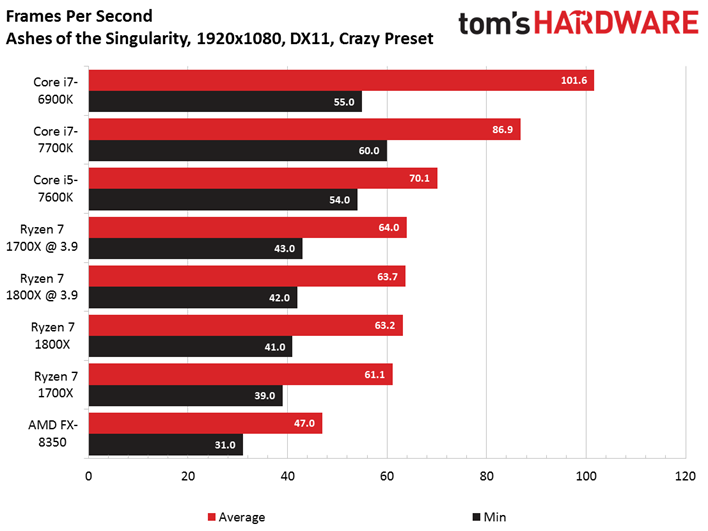
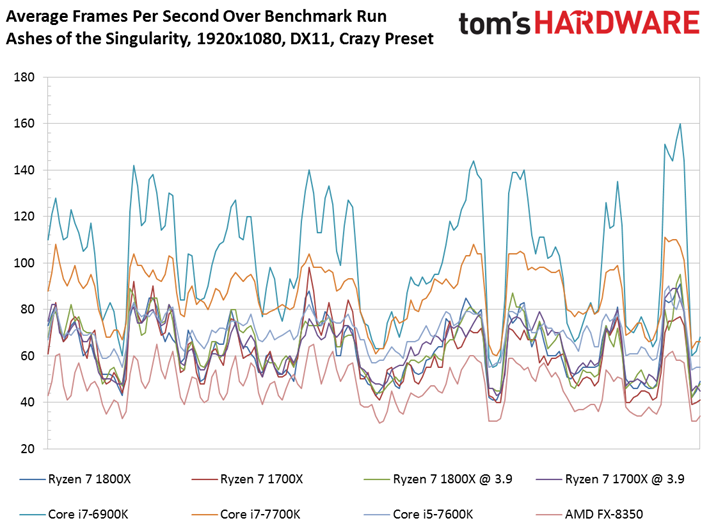
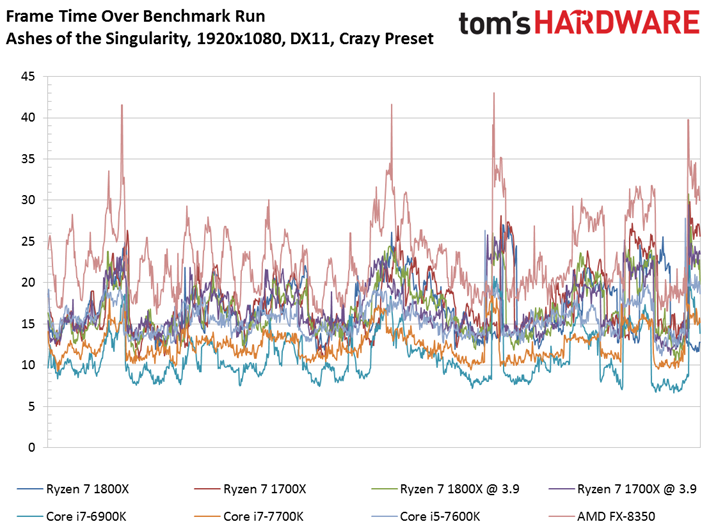
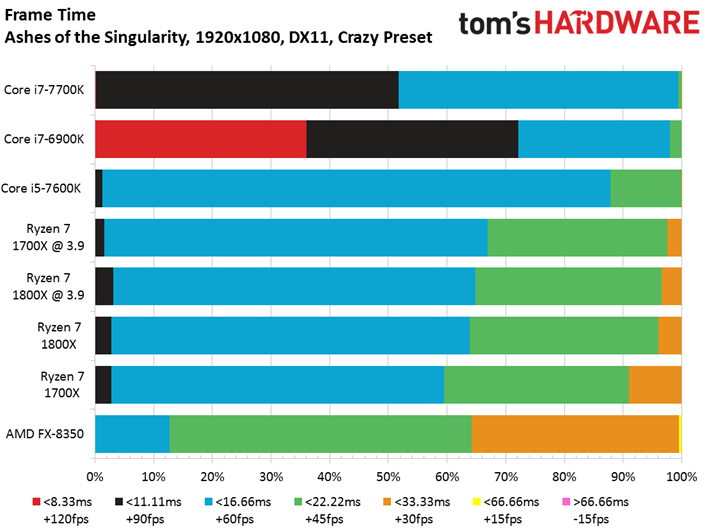
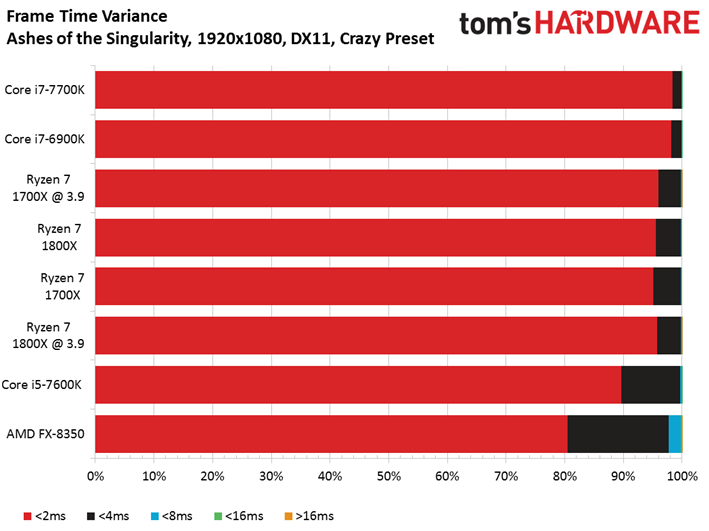
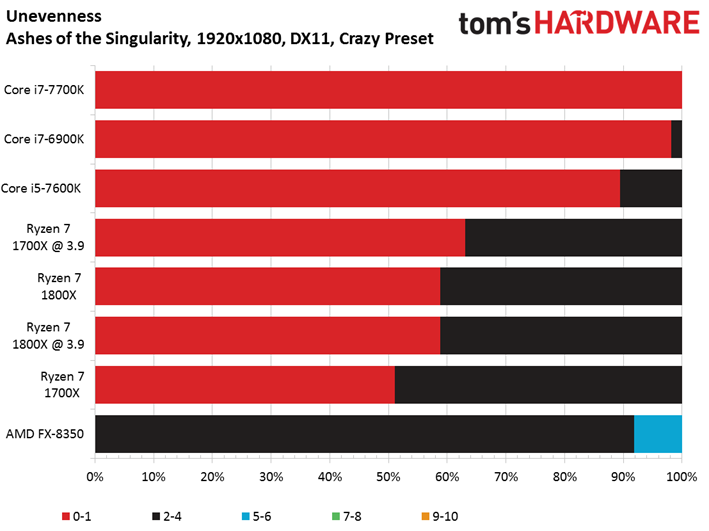
Ryzen 7 CPUs lag behind the Intel competition (even its Core i5) by a considerable margin.
Get Tom's Hardware's best news and in-depth reviews, straight to your inbox.
At stock clock rates, the 1800X outpaces AMD's 1700X by 2.1 FPS on average. However, the overclocked Ryzen 7 1700X roughly matches the higher-end model. Given the frequency boost and correspondingly small speed-up, something other than clock rate is holding Ryzen back.
Fortunately, all of the processors except AMD's FX-8350 provide smooth-enough frame rates at 1920x1080.
Battlefield 1
We dialed Battlefield 1 up to Ultra preset and trudged across the landscape in O La Vittoria. The game flirts with a graphics bottleneck, even at 1920x1080, so there isn't as much performance variation between host processors.
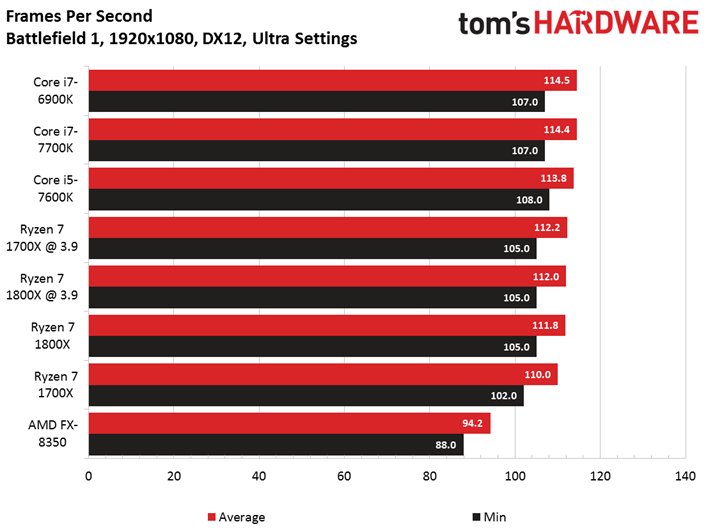
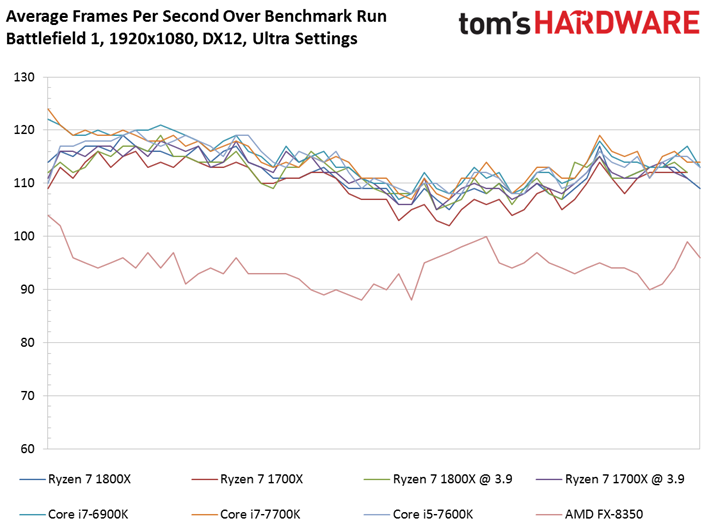
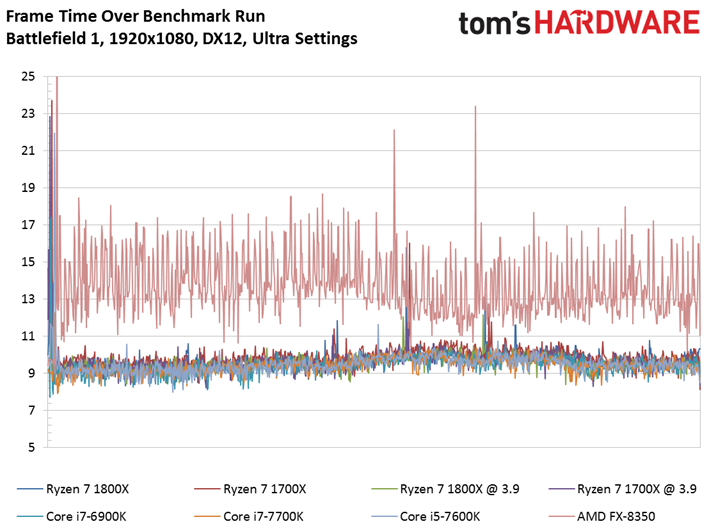
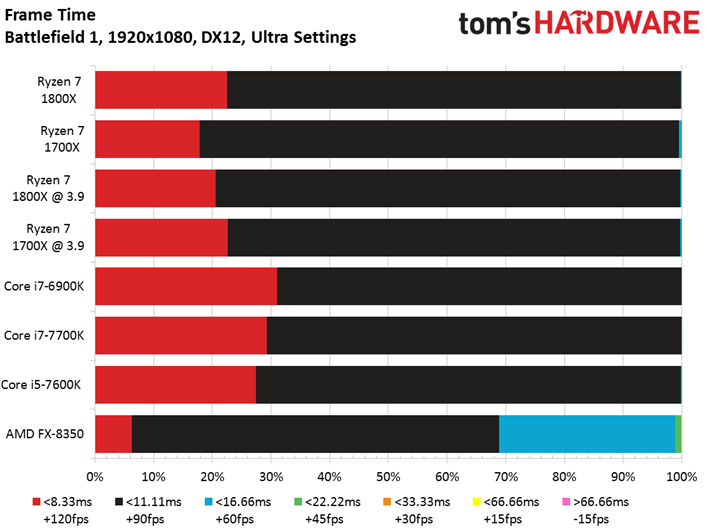
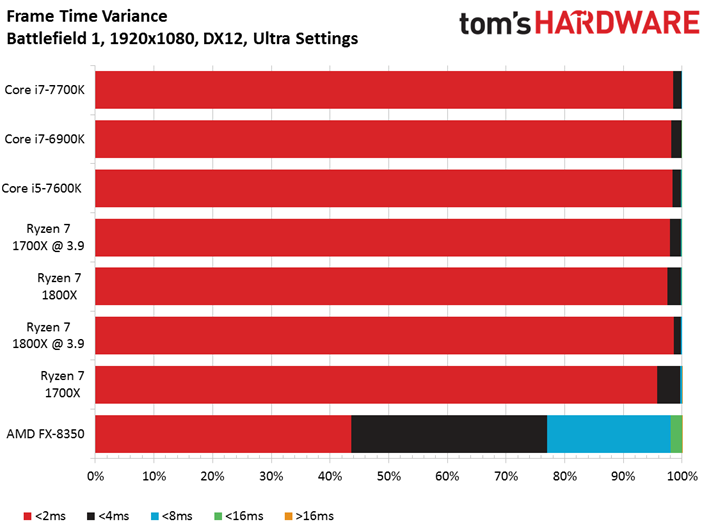

While both overclocked Ryzen 7 CPUs trump the stock configurations, average frame rates in Battlefield 1 are so close that there's little reason to compare performance. Only the FX-8350 stands out as a notably slower CPU unworthy of your high-end graphics hardware.
Battlefield 4
Battlefield 4 behaves similarly, also emphasizing graphics performance (even at 1920x1080). As a result, the Ryzen 7 CPUs are right there in the mix with Intel's fastest desktop processors.
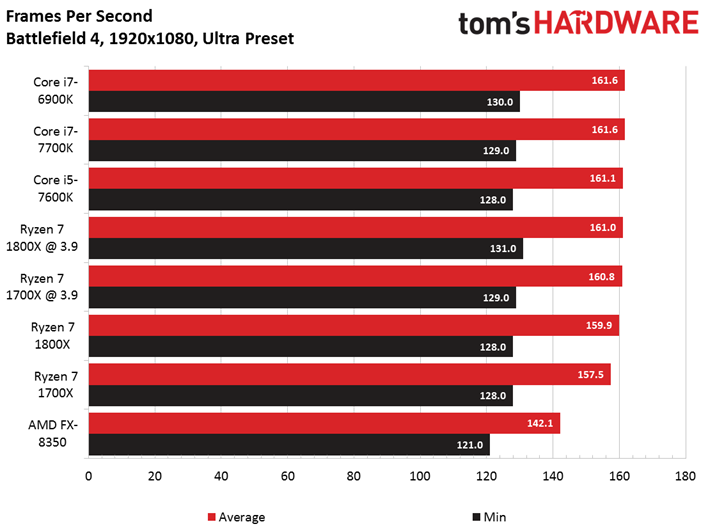
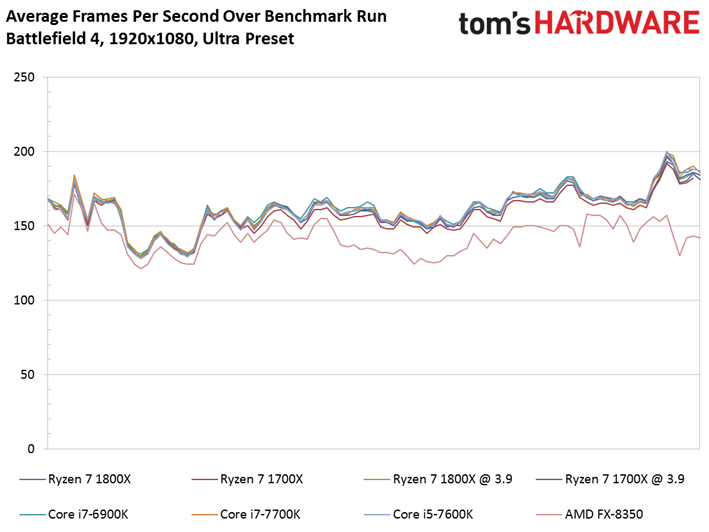
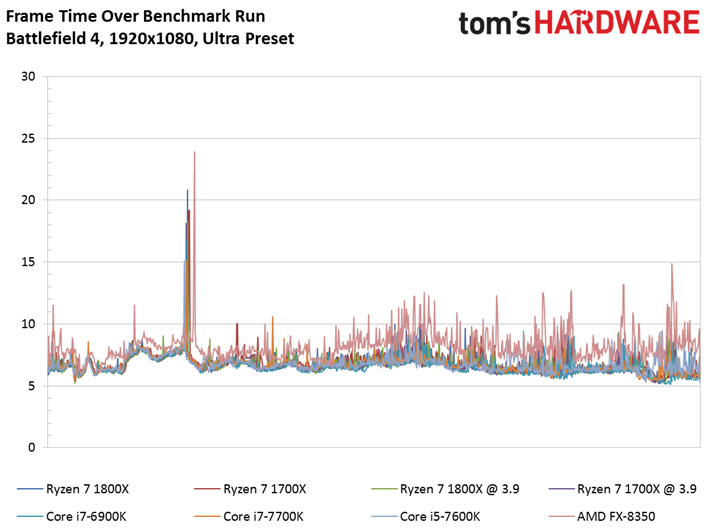
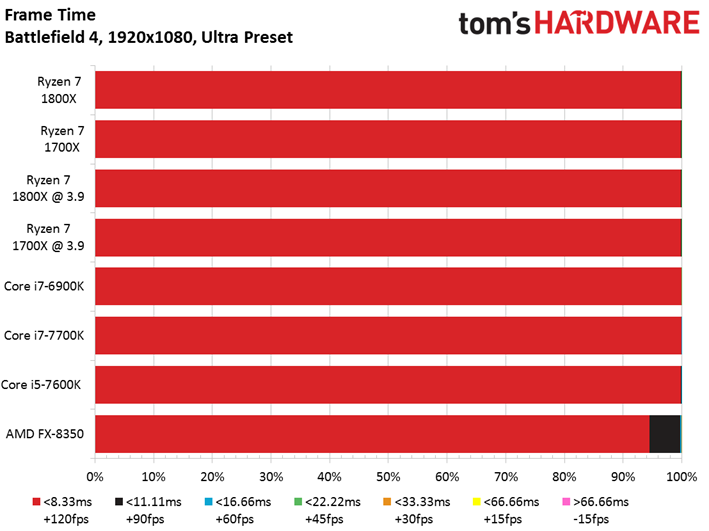
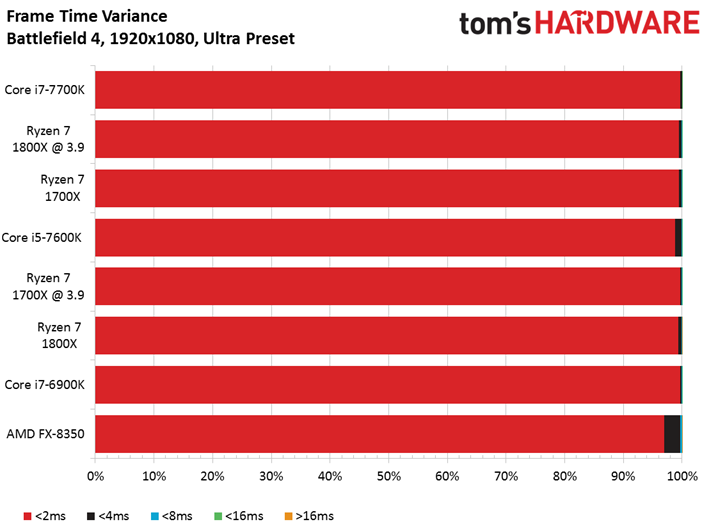
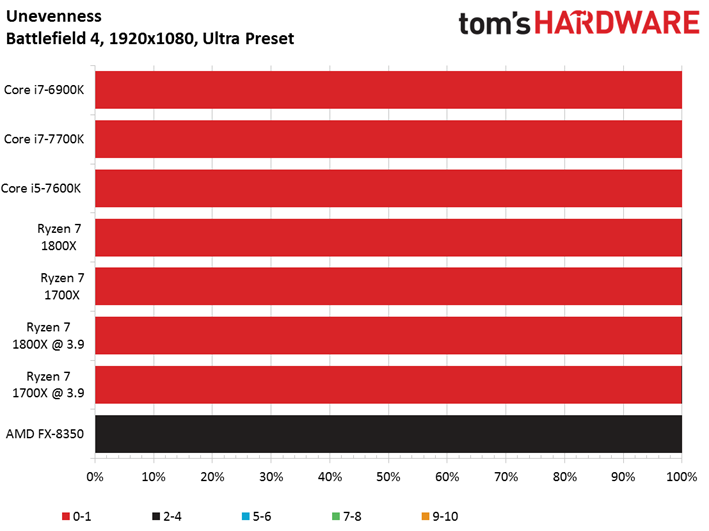
The stock Ryzen 7 1700X trails the field slightly, but bumping it to 3.9 GHz adds a few FPS, edging out the stock 1800X. Meanwhile, the FX-8350 is our only real loser.
Current page: 3DMark, Ashes of the Singularity, Battlefield 1 & 4
Prev Page Overclocking And Test Setup Next Page Civilization VI AI & Graphics Test, Deus Ex: Mankind Divided, GTA V
Paul Alcorn is the Editor-in-Chief for Tom's Hardware US. He also writes news and reviews on CPUs, storage, and enterprise hardware.
-
Ergosum Whoever runs PR at AMD needs to reevaluate their methods. The 1800's and 1700's are very solid products, but for some reason were shadow marketed--letting rumor define the target application sets.Reply
AMD should have had a strong positive campaign on where these chips do well. Specific. Timely. They would have gathered some gamers who wanted to brag about handbrake performance or some-such. Instead they let the market build fairy castles in the sky about gaming-specific performance, and so (again) lost a great deal of goodwill and trust. -
hannibal The problem is that the market made those cloud castless, not the AMD... it is hard to AMD to say users not to speculate. Every information that AMD did give out was confirming that Ryzen was going to be really good multicore performer, and we all know that very few game use more that teo or three threats, so the extra 4-6 cores that Ryzen has normally Are useless I. The games, so any Intel 2-4 core prosessor wa going to better in the games if They would run in higher freguences that Ryzen and AMD very clearly tell us that 3.8 was the very near the top of the prosessor speed.Reply
If and when games start supporting 8 cores the 1700 is super good perfomer in the games too, but if and most propably because the situation stays the same. 2-4 more powerfull cores is always better in games that having more of them.
It seems that people now know games really poorly if They expected the Ryzen has any chance in those.
Ryzen 1500 (four cores) is as fast in the games than 1800X is and 1500 is much cheaper.
http://www.techspot.com/review/1360-amd-ryzen-5-1600x-1500x-gaming/ -
TechyInAZ Good review. Can't wait until software devs and motherboard manufactuer's get better optimized softwares and BIOS's so Ryzen isn't constantly dealing with this problem anymore.Reply -
dstarr3 Reply19481950 said:Conclusion: Ryzen still sucks.
It's not that Ryzen sucks, it's that Ryzen was meant to compete with Xeon CPUs, which it does very well. Gamers should look elsewhere, but for some reason, gamers are the ones that got most excited about these CPUs. -
elbert I wouldn't suggest either a 1070 nor the 1080 on 1080p. Probably should have tested with a more normal 1060 6GB at that resolution. Those willing to pay high prices for both the CPU and GPU should be running at 1440p. The game benchmarks are unnaturally skewed.Reply
The biggest thing to look at in the game benchmarks is how unutilized the Ryzen CPU's are. We will probably see the Ryzen R5 quads running the same FPS for a few hundered less then all but the old 8350 on April the 11th.
Also it looks like AMD is gearing up a new socket with 8, 12, and 16 cores on an X390 motherboard. At the current pricing the 16 core could be lower priced than Intel's over priced 6900 8 core. -
Achaios ?ll this talk about games supporting more than 4 cores is really a COMPLETE WASTE OF TIME.Reply
46.19% of Steam Gamers own 2-Core CPU's and 47.74% of Steam Gamers own 4 Core CPUs. No Game Studio is going to waste resources and money on optimizing games for more than 4 cores in the foreseeable future, if ever.
According to the same survey, only 0.24% of gamers own octacore CPU's. A little less than this is the presence of AMD Ryzen CPU's in the gaming market. Almost nonexistent.
I wish I was trolling. -
Oranthal Why did you only test 1080p performance? Most people who would consider these CPUs run an RX-480 or greater GPU if they are gaming ($300+ is still the premium market). Other reviews show the gaps shrinking or disappearing with greater resolutions as the bottlenecks are at the GPU where most die-hard review reading gamers will actually be limited.Reply -
Oranthal Reply19482020 said:I wouldn't suggest either a 1070 nor the 1080 on 1080p. Probably should have tested with a more normal 1060 6GB at that resolution. Those willing to pay high prices for both the CPU and GPU should be running at 1440p. The game benchmarks are unnaturally skewed.
The biggest thing to look at in the game benchmarks is how unutilized the Ryzen CPU's are. We will probably see the Ryzen R5 quads running the same FPS for a few hundered less then all but the old 8350 on April the 11th.
Also it looks like AMD is gearing up a new socket with 8, 12, and 16 cores on an X390 motherboard. At the current pricing the 16 core could be lower priced than Intel's over priced 6900 8 core.
100% spot on. I would of skipped my comment had I seen this when I started writing it.